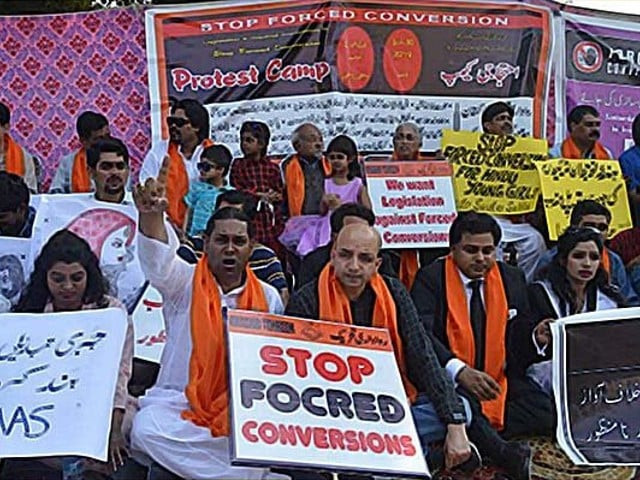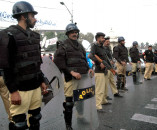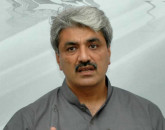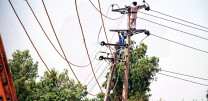Parliamentary committee rejects anti-forced conversion bill
Move prompts protest from members of minority communities saying their lives will become 'living hell' after rejection

Following the opposition from the Ministry of Religious Affairs, a parliamentary committee on Wednesday rejected the anti-forced conversion bill, prompting protest from the lawmakers belonging to the minority communities.
Minister for Religious Affairs and Interfaith Harmony Sahibzada Noorul Haq Qadri, during the meeting of the Parliamentary Committee to Protect Minorities from Forced Conversions, said that the environment was "unfavourable" for formulating such a law.
He said that legislation on the matter could create law and order situation in the country, adding that the provincial governments, the National Assembly speaker and the Prime Minister's Office may take other measures to address the issue.
Read more: Minority lawmakers stand against forced conversions
According to him, formulating law on forced conversions would deteriorate peace in the country and create further problems for minorities, leaving them more vulnerable.
Senator Mushtaq Ahmed from Jamaat-e-Islami denied that the problem of forced conversions existed in Pakistan. "This bill is anti-Islam," he claimed.
Prohibtion of forced conversion bill 2021
— Senator Mushtaq Ahmad Khan (@SenatorMushtaq) October 13, 2021
دستورکےآرٹیکل2،2اے 20 ،31 ،227 کیخلاف.@ciigov کااسپر43اعتراضات/تحفظات کااظہار۔یہ جبری تبدیلی مذہب کوروکنےکانہیں اسلام قبول کرنےسےجبراروکنےکابل۔اسکومستردکیاجائے۔ @SenatePakistan اور @NAofPakistan کی مشترکہ پارلیمانی کمیٹی نےاسکومستردکردیا۔ pic.twitter.com/Zv8WxDIh6w
Putting the blame on the government for proposing the bill, the JI senator said that due to the incumbent government's wrong policies and negligence, the minorities were facing issues.
Minister of State for Parliamentary Affairs Ali Muhammad Khan said the issue had already been raised before the premier, who had formed a special parliamentary committee on the matter.
He said that the government was serious about addressing the problem. However, he added, the law should not be made on the subject for getting praise from international or non-governmental organisations.
Also read: Govt must regulate freedom to practice religion: SC
Ali said that setting an age limit in the matter goes against Islam and the Constitution of Pakistan, therefore, legislation was being opposed.
PTI MNA Lal Chand Malhi, speaking on the occasion, said that by rejecting the bill, the minorities are being cornered and their life will become a "living hell".
He said that an impression was being given that forced conversions were not an issue in the country.
Responding to this, an enraged Senator Mushtaq Ahmed said: "No matter what happens, we will not allow anyone to go against Islam."
Another committee member, Maulvi Faiz Ahmed, also said the bill was against Islam and Shariah. "And we will not allow any legislation in this country that is against Islam," he added.
The minority communities' members argued that young people were being "kidnapped" and forcibly converted to Islam.
PTI lawmaker Ramesh Kumar clarified that many Hindus were promised money and marriages in order to lure them into converting, adding that they were not opposed to willful conversion.
He added that apparently, the government was more worried about the backlash from the legislation from certain elements.
PTI's Lal Chand Malhi, during an interview later in the evening, said that the members of minorities said during the meeting that what the members believed was "anti-Islamic" in the bill can be removed and the parliament should decide this. However, he lamented, it was the mindset of certain members that the real issue.
"Unfortunately, there are certain elements within the party that have conservative mindset," he added.
Malhi said that the minority’s representatives are told that after the 18th amendment, it is the provinces' domain to legislate on such matters but added that they do not get the desired result at that level too.
"Some members tweet that I should leave the party [over stance on forced conversion bill] but what party should I join after leaving this (PTI)," he added.
Earlier while talking to The Express Tribune, Parliamentary Committee to Protect Minorities from Forced Conversions Chairperson Senator Anwaar-ul-Haq Kakar said: "Forced conversion is an issue that stems more from financial, social and sexual context, than religious and spiritual. Ninety eight per cent of forced conversion cases take place with underprivileged girls, who run away from their homes. There's seldom been any case like such for women who are doctors and engineers, or just higher up the social class."
"Muslim men can theologically marry a Christian girl but not a Hindu girl and the legislators can’t impose a financial limit for discouraging such marriages. It’s a broad-base issue and the solution lies in a legislation that should determine the same age of marriage across the country. To assure which, the certificate of marriage should be issued by a sessions judge; mechanism for providing protection should be established and the practice of tendering forged documents to make a case should strongly be countered," he told The Express Tribune.



















COMMENTS
Comments are moderated and generally will be posted if they are on-topic and not abusive.
For more information, please see our Comments FAQ